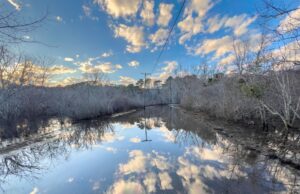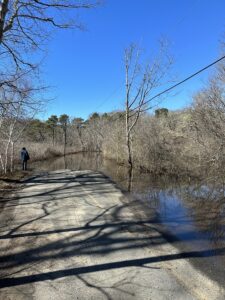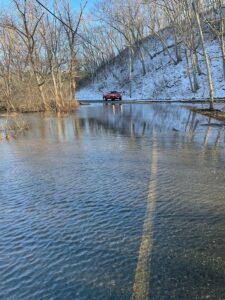WELLFLEET — For at least eight days this month, the roads connecting Bound Brook Island to the rest of town have been inundated with floodwater that prevented people from accessing the island.

The most recent flooding was at least the third time both access roads to the island — from Old County and Pamet Point roads to the north and Coles Neck Road to the south — have been flooded this winter, according to neighbors, some of whom live year-round on Bound Brook Island Road.
On March 10, the Wellfleet Police Dept. said on its Facebook page that the area around Bound Brook Island had become impassable due to flooding, but Nathaniel Hall Taylor, whose family owns property there, said that the flooding began on March 7. It took until March 18 for the barricades to be removed, according to Taylor and Peter McMahon, director of the Cape Cod Modern House Trust, which manages the Hatch house on the island.
These events, said Taylor and other neighbors, were mostly unheard of before this year. One resident, Sharon Dunn, who wrote An Island in Time, a history of the island, said that flooding cut off access in April 2022. No one the Independent interviewed recalled a time when the higher-elevation northern access from Old County and Pamet Point roads had been cut off before that.
“This is definitely a historic event,” said Taylor.
Geoff Sanders, chief of natural resource management at the Cape Cod National Seashore, agreed, describing the event as “anomalous” and adding, “It was unusual to see flooding events in three consecutive months.”
Sudden flooding trapped resident Penelope Jencks on the island on Jan. 13. “The road had become a river,” Jencks recalled. She waited until the next day to try to leave, hoping the tides would take the water out, but when the road was still blocked the following morning she called the fire dept. to rescue her.

Pamet Point Road was flooded again on Feb. 12, Taylor said, and was still flooded on Feb. 16, according to photos taken by neighbor Carl Frederiksen
The cause of this flooding is the overwash at Duck Harbor, wrote Wellfleet Dept. of Public Works Director Jay Norton in an email. Starting in 2021, the overwash has sent salt water into the marsh around Bound Brook Island. High tides that have coincided with storms and westerly winds have exacerbated the problem, said Norton.
Continuing erosion of the area’s dunes has made the inflow of water more extensive, said Christa Drew, executive director of Friends of Herring River.
There is no evidence that activities related to the Herring River Restoration Project have played a role in the flooding, said Norton. For one thing, the overwash predates the project, he said. Sanders agreed, saying that the flooding is “completely unrelated.” He confirmed that the project will not actually be altering the water level in the estuary until the new Chequessett Neck Road bridge is complete, likely sometime next year.
Many Bound Brook Island homeowners visit only in the summer, but with flooding seemingly becoming more regular, all six owners whom the Independent spoke to, as well as McMahon, are concerned that the flooding will persist.
The flooding has already prevented a repairman from servicing the furnace at the house of Frederiksen and his sister, Tatiana Miller. They are also concerned about whether emergency vehicles would be able to access the island, Miller said.
Jencks, Taylor, and McMahon also worried about safety. When Jencks was rescued in January, a fire truck was unable to reach her, and a boat was required to ferry her across the water. “Imagine if the water rose overnight and you had 11 families and their dogs and their belongings that were trapped,” McMahon said.

Miller, Dunn, and Taylor mentioned that the flooding could have financial consequences for those who rent their houses out for part of the year. Miller said that she and her brother rely on rental income to pay their property taxes.
At press time, a meeting including the Wellfleet DPW, town administration, police, and fire departments was planned for Wednesday, March 20, according to Norton, at which near-term solutions to the flooding would be discussed. The subject will be on the select board’s agenda for Thursday, March 21, according to select board chair Barbara Carboni.
In the long term, the Herring River Restoration Project will help solve this problem, said project coordinator Carole Ridley. She explained that the flood water is unable to drain because of the narrow culverts along the river’s floodplain and failing tidal gates at the Chequessett Neck Road dike. The project will be widening those culverts and introducing new tidal gates to improve drainage and will also be raising low-lying roads like Pamet Point and Bound Brook.
Regarding short-term remedies on the table now, Norton said that he “can’t speak to any solutions yet” as they are still in the planning phase and will require permitting from various agencies.
Sanders said that the town and the Seashore have been exploring a way to accelerate the raising of low-lying roads through the restoration project. He said permitting for that is mostly lined up but practical considerations like finding material remain. Additionally, because the road edges are sloped, raising the roads will also widen them, essentially turning a sliver of Seashore land into town land. Sanders said the Seashore and town are exploring a “land exchange” to compensate the Seashore for this lost land.
Sanders said that there are also plans to improve drainage to allow flood water to dissipate faster. But for now, he said, there is “nothing concrete.”
Property owners, meanwhile, suggested everything from constructing a berm at Duck Harbor to building a temporary bridge out of railroad ties or floating barges.
Jencks, for her part, suggested with tongue in cheek a “little ferry” to bring residents across. “With a little pole to push it across and a gondolier,” she said. “I think that would be great.”



